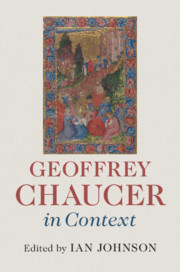Book contents
- Geoffrey Chaucer in Context
- Geoffrey Chaucer in Context
- Copyright page
- Contents
- Illustrations
- Contributors
- Abbreviations
- Introduction
- Part I Chaucer as Context
- Part II Books, Discourse and Traditions
- Part III Humans, the World and Beyond
- Part IV Culture, Learning and Disciplines
- Chapter 26 Childhood and Education
- Chapter 27 Philosophy
- Chapter 28 The Medieval Universe
- Chapter 29 Medicine and the Mortal Body
- Chapter 30 The Law
- Chapter 31 Art
- Chapter 32 Architecture
- Chapter 33 Heraldry, Heralds and Chaucer
- Part V Political and Social Contexts
- Part VI Chaucer Traditions
- Further Reading
- Index
Chapter 27 - Philosophy
from Part IV - Culture, Learning and Disciplines
Published online by Cambridge University Press: 24 June 2019
- Geoffrey Chaucer in Context
- Geoffrey Chaucer in Context
- Copyright page
- Contents
- Illustrations
- Contributors
- Abbreviations
- Introduction
- Part I Chaucer as Context
- Part II Books, Discourse and Traditions
- Part III Humans, the World and Beyond
- Part IV Culture, Learning and Disciplines
- Chapter 26 Childhood and Education
- Chapter 27 Philosophy
- Chapter 28 The Medieval Universe
- Chapter 29 Medicine and the Mortal Body
- Chapter 30 The Law
- Chapter 31 Art
- Chapter 32 Architecture
- Chapter 33 Heraldry, Heralds and Chaucer
- Part V Political and Social Contexts
- Part VI Chaucer Traditions
- Further Reading
- Index
Summary
Though Chaucer seems to have matriculated at neither of England’s medieval universities, his acquaintance with philosophical ideas of the classical and medieval traditions is strikingly evident in his writings. He also had friends at the University of Oxford, including the ‘philosophical’ Strode to whom he dedicates Troilus and Criseyde. His principal textual authority was Boethius’ De consolatione philosophiae, but he also drew on the works of the Neoplatonic poets Alan of Lille and Bernard Silvester. The philosophical themes explored by these writers, which range from the origin and ordering of the universe to the function of nature and the relationship between fate and free will, are addressed in different ways in his literary narratives, perhaps most subtly and successfully in Troilus and Criseyde. Cicero’s Somnium Scipionis, on which the narrator dwells at the beginning of the Parliament of Fowls, was known to Chaucer through the commentary on this text produced by Macrobius, which itself supplied the classification of dreams that confounds the narrator of the House of Fame, and to which Pertelote wisely appeals in the interpretation of his own prophetic dream in the Nun’s Priest’s Tale. Though not typically remembered as a philosopher, Chaucer was certainly a philosophical poet.
- Type
- Chapter
- Information
- Geoffrey Chaucer in Context , pp. 230 - 238Publisher: Cambridge University PressPrint publication year: 2019

